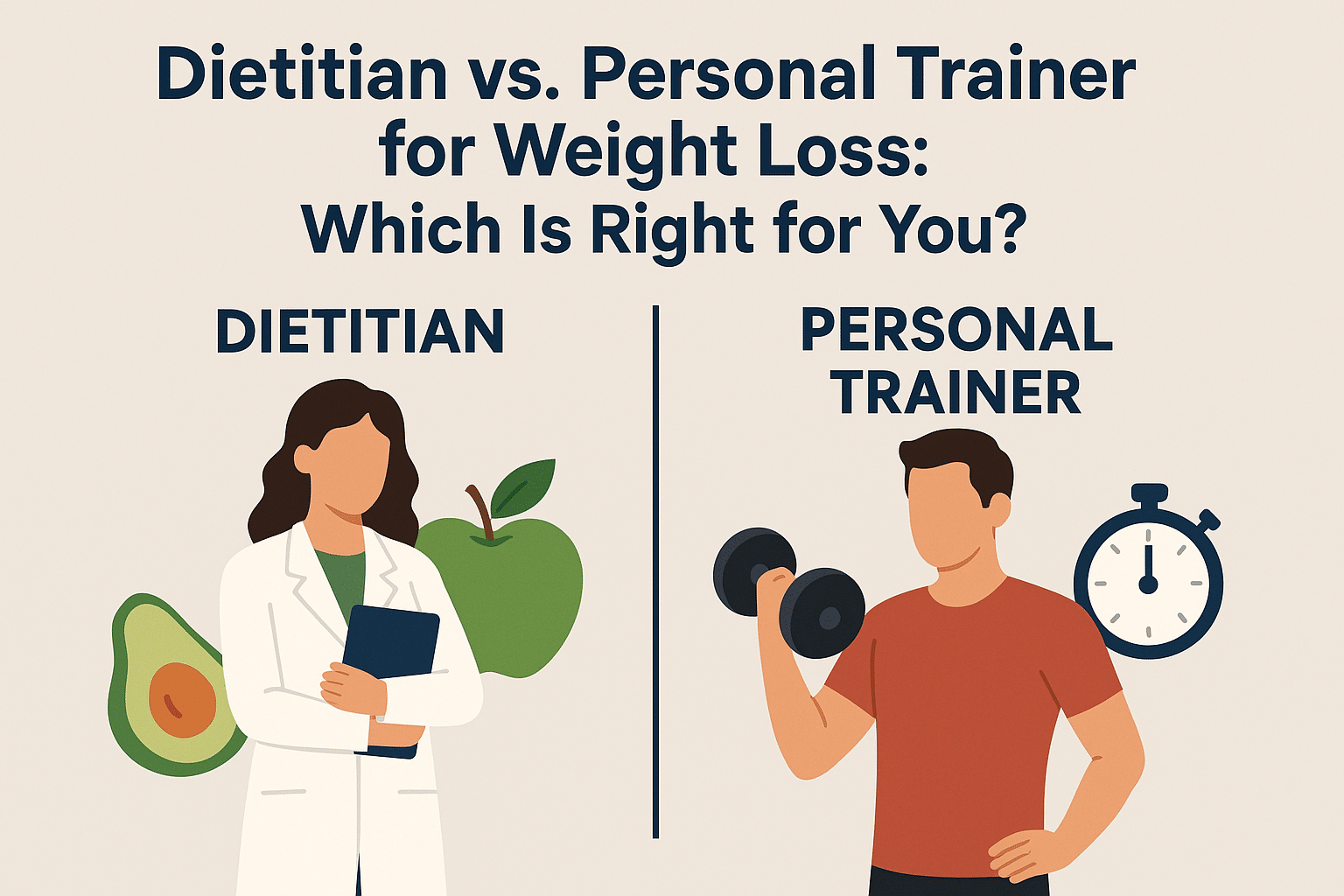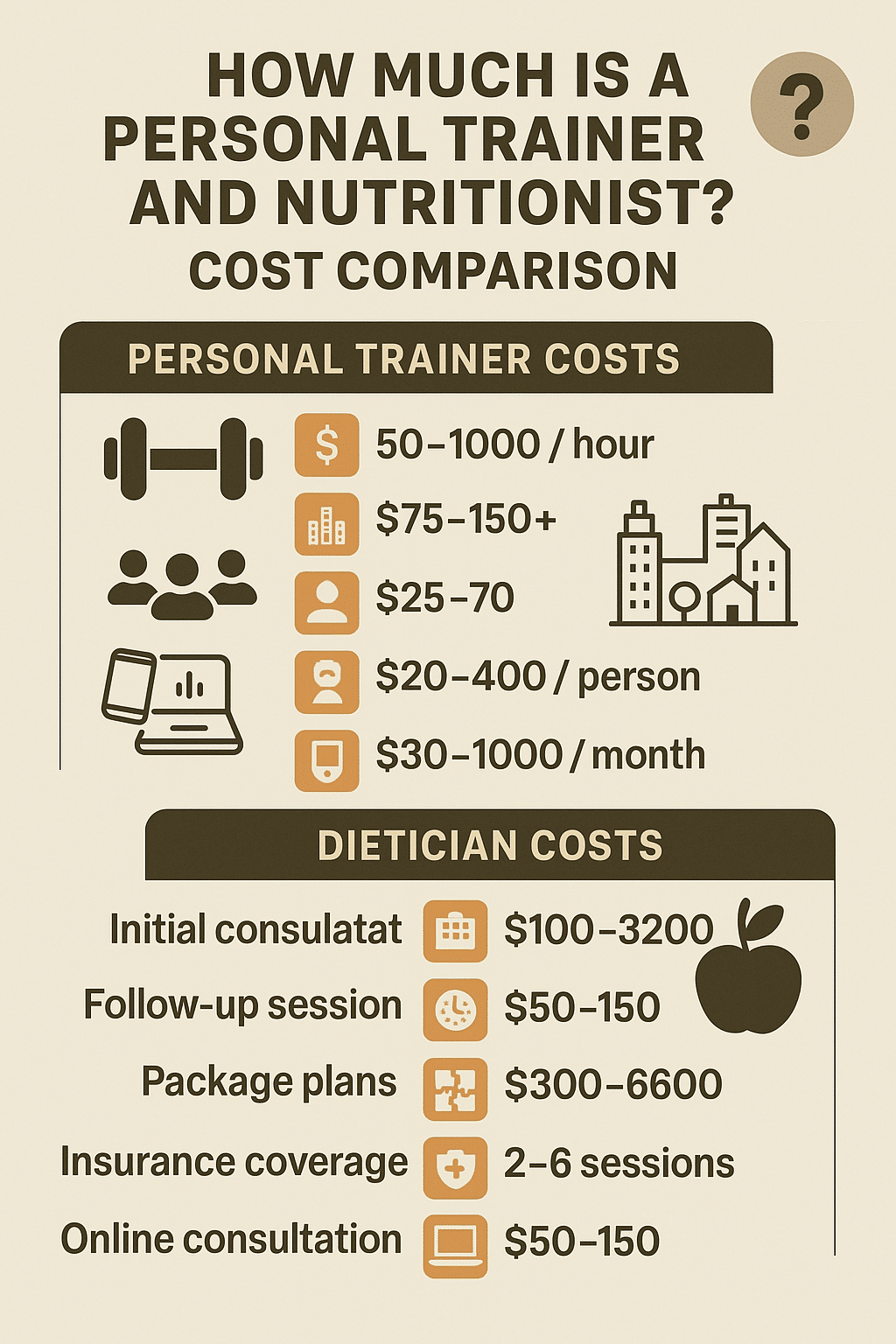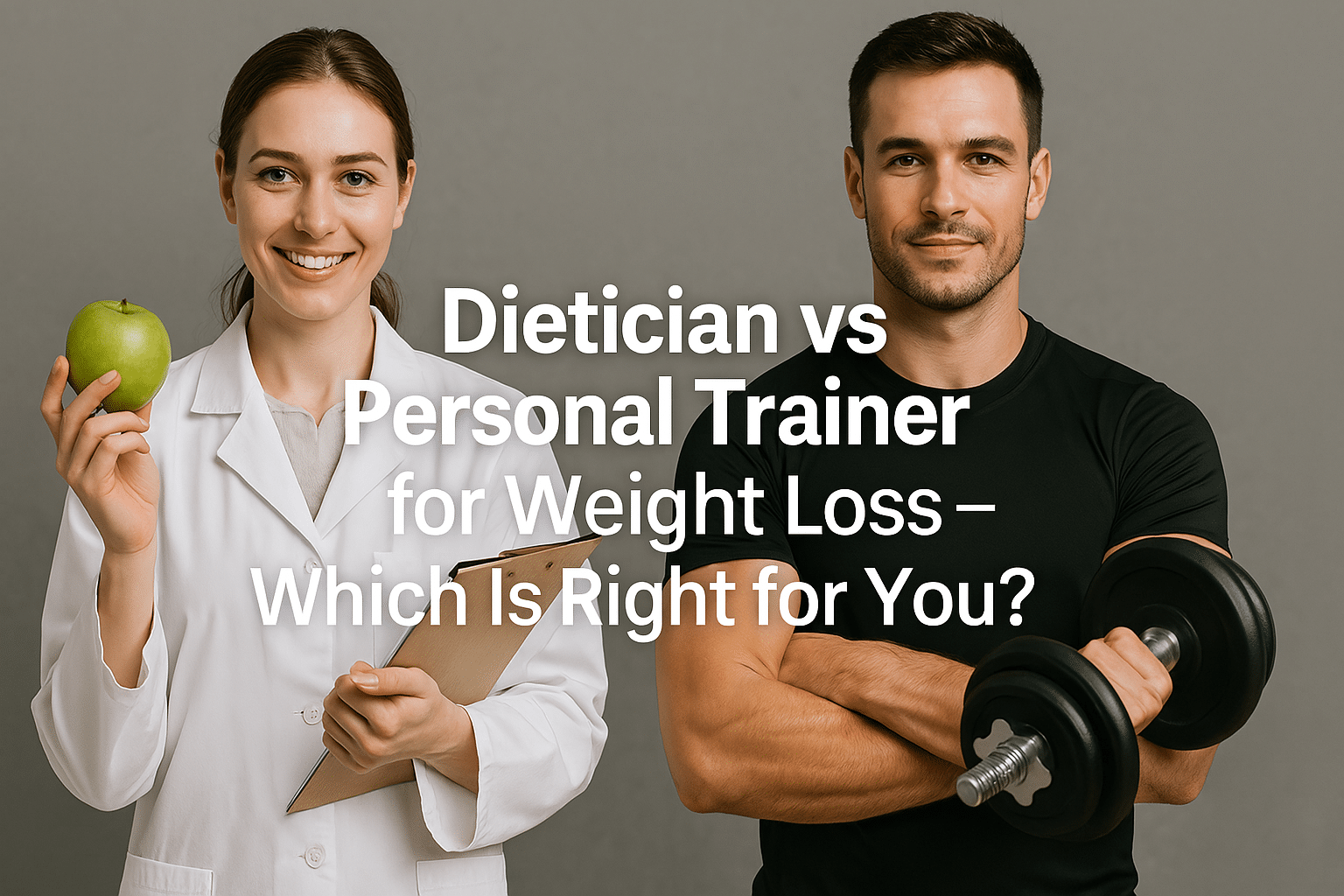When you’re serious about losing weight but can only afford one professional, should you choose a dietician vs personal trainer? I’ve helped many people over 50 make this exact decision, including most recently, my friend Carol who lost 42 pounds at age 57 after years of frustration.

This choice matters because investing in the wrong option for your specific needs can waste both time and money. Let’s break down exactly how to decide what’s right for you.
Table of Contents
Understanding Your Weight Loss Goals
Before deciding between a dietician or trainer, get crystal clear on what you want.
Are you trying to lose 50+ pounds? Do you need to lower cholesterol or blood pressure? Or are you mostly focused on body composition and muscle tone?
Ask yourself:
- Have I struggled more with food choices or exercise consistency?
- Do I have any health conditions affecting my diet or activity?
- What has worked (or failed) in past weight loss attempts?
- Am I confident in my knowledge of nutrition or exercise?
Your honest answers will point you toward the better choice.
Being Realistic About Your Weight Loss Goals
No matter which professional you choose, setting realistic weight loss expectations is crucial for success.
Many clients come to me wanting to lose 20 pounds in a month because they saw a celebrity do it. This sets you up for disappointment and can damage your long-term progress.
Healthy, sustainable weight loss typically ranges from 1-2 pounds per week. For adults over 50, often closer to 0.5-1 pound weekly is more realistic and sustainable.
Consider these realities:
- Women over 50 experience metabolic changes from menopause that can slow weight loss
- Men lose muscle mass at an accelerated rate after 50, affecting metabolism
- Certain medications common in midlife can affect weight loss rate
- Recovery between workouts takes longer as we age
My client Patricia got frustrated when her younger trainer promised she’d lose 30 pounds in three months. When she only lost 12, she quit altogether. Had she recognized this as excellent progress for her age and health status, she would have continued and reached her goal eventually.
Remember that the journey isn’t linear. You’ll experience plateaus that require adjustments from whichever professional you’re working with.
Set milestone goals rather than focusing solely on the end result. Celebrate improvements in energy, sleep quality, strength, and clothing fit—not just scale numbers.
How Much Is a Personal Trainer and Nutritionist? Cost Comparison
Cost is often the deciding factor when choosing between a dietician and personal trainer. Here’s what you can expect to pay based on current market rates:
Personal Trainer Costs
- Average session cost: $50-$100 per hour
- Urban areas like NYC or LA: $75-$150+ per hour
- Small cities and rural areas: $35-$70 per hour
- Group training sessions: $20-$40 per person
- Online personal training: $30-$100 per month for app-based programs
Most clients see results with 2-3 sessions weekly for at least 8-12 weeks, creating a total investment of $800-$3,600 for the initial transformation phase.
My client Tom found a certified personal trainer at his local YMCA for $45 per session, significantly less than private gym rates. Community centers often offer more affordable options.

Dietician Costs
- Initial consultation: $100-$200 (often 60-90 minutes)
- Follow-up sessions: $50-$150 per hour
- Package plans: $300-$600 for 3-6 session packages
- Insurance coverage: Many plans cover 2-6 sessions annually with partial copays
- Online consultations: $50-$150 per session
Most dieticians recommend monthly follow-ups for 3-6 months, creating a total investment of $250-$900 for complete nutrition guidance.
When my neighbor Sandra looked into nutrition counseling, she discovered her insurance covered 4 sessions with a registered dietician at just a $30 copay each after she received a referral from her primary care physician.
Cost-Saving Strategies
- Insurance coverage: Many health insurance plans cover dietician visits with a doctor’s referral, especially for conditions like diabetes or heart disease
- University clinics: Dietetic interns supervised by registered dieticians often offer services at 30-50% discount
- Group sessions: Some personal trainers offer small group sessions at half the individual rate
- Package deals: Both professionals typically offer 10-20% discounts when purchasing multiple sessions upfront
- Workplace wellness: Many employers offer partial reimbursement for wellness services
The most cost-effective approach often starts with a few sessions with your priority professional (dietician or trainer), then using free or low-cost resources to fill the gap with the other discipline.
Dietician vs. Nutritionist: Important Differences
Many people use these terms interchangeably, but the differences are crucial when investing in weight loss help.
A registered dietician (RD) or registered dietitian nutritionist (RDN) has:
- Completed a bachelor’s degree in nutrition and dietetics
- Finished 1,200+ hours of supervised practice
- Passed a national examination
- Maintained continuing education requirements
- Legal ability to provide medical nutrition therapy
A nutritionist may have extensive knowledge but:
- Has varying levels of education (from self-taught to certified)
- Faces fewer regulatory requirements in most states
- Cannot provide medical nutrition therapy in clinical settings
- May have specialized in certain areas without comprehensive training
For weight loss with health complications like diabetes, heart conditions, or digestive disorders, a dietician offers medical-grade expertise. Their recommendations are evidence-based and backed by clinical training.
Nutritionists may provide general wellness guidance and meal planning but lack the clinical background for complex health needs.
Always verify credentials before hiring anyone for nutrition advice. The title “nutritionist” alone doesn’t guarantee professional training.
What a Dietician Offers for Weight Loss
A registered dietician is a food and nutrition expert with clinical training. This isn’t just someone who gives general advice about eating healthy.
Working with a dietician gives you:
- A personalized eating plan based on your metabolism, health conditions, and preferences
- Education about portion control and food choices
- Help identifying emotional eating triggers
- Strategies for dining out and social situations
- Guidance navigating food allergies or health conditions
A dietician is particularly valuable if you’ve tried multiple diets without lasting success or have conditions like diabetes, heart disease, or digestive disorders.
Many people underestimate how much their food choices impact weight loss. Remember the saying: “You can’t outrun a bad diet.”
When my client Jim started working with a dietician at 65, he discovered his “healthy” breakfast of granola and juice contained over 600 calories and 42 grams of sugar. With simple breakfast adjustments alone, he dropped 11 pounds in the first month.
What a Personal Trainer Offers for Weight Loss
A certified personal trainer specializes in exercise programming and motivation. The best ones understand both exercise science and behavioral psychology.
With a personal trainer, you’ll get:
- Customized workout plans matched to your fitness level
- Proper exercise technique to prevent injury
- Progressive challenges as your fitness improves
- Accountability and motivation during tough periods
- Strategies to overcome exercise plateaus
Trainers excel at helping people who know what to eat but struggle with consistency in exercise or need help building muscle to boost metabolism.
Exercise brings benefits beyond weight loss too – improved mood, better sleep, and increased energy can all make healthy eating easier.
My neighbor Marie hired a trainer after recovering from knee surgery. By focusing on proper form and gradually building strength, she lost 26 pounds in 5 months without changing her diet much. The trainer taught her exercises she’d never have attempted alone.
The Numbers Don’t Lie: Weight Loss Statistics
Recent research sheds light on this decision:
- A review published in the Journal of the Academy of Nutrition and Dietetics found people working with dieticians lost an average of 2.7 more pounds than those on self-directed weight loss programs.
- According to the American College of Sports Medicine, people lose 20% more weight when combining diet with exercise versus diet alone.
- A 2023 study in the International Journal of Obesity revealed that 67% of people who successfully maintained weight loss for 5+ years used professional guidance for either nutrition or exercise.
- For adults over 50, muscle loss accelerates to 1-2% yearly without strength training, significantly lowering metabolism. Personal training can reverse this trend.
These statistics suggest the ideal approach combines both nutrition and exercise expertise.
Making Your Decision: Key Factors to Consider
Current Habits Assessment
If you already exercise regularly but eat whatever’s convenient, a dietician likely offers more value. If you’re careful about food but rarely move your body, a trainer might be the missing piece.
Health Limitations
Certain conditions require nutritional expertise. If you have diabetes, kidney disease, food allergies, or digestive disorders, prioritize a dietician.
If you have orthopedic issues, past injuries, or concerns about exercise safety, a trainer’s guidance becomes more important.
Motivation Style
Consider how you stay motivated. Do you need someone checking your form and pushing you through workouts? Or do you need help planning meals and making grocery lists?
Be honest about which area you’re more likely to maintain independently.
I personally struggled with portion control for years despite knowing what healthy foods were. Working with a dietician who had me photograph my meals for two weeks was eye-opening – my “small portions” were often double what I needed.
One of food apps I recommend is FoodView. It’s a free app to make keeping a photo food diary as quick & easy as possible. I like that there is no calorie tracking, barcode scanning or manual data entry. The app is just to keep a visual reminder of what you eat.
Hidden Costs
The initial consultation isn’t the only expense. With dieticians, factor in potential costs for specialized foods or supplements. With trainers, consider workout clothes, home equipment, or gym memberships.
How to Get the Best of Both Worlds
Most people eventually need both nutrition and exercise support. Here’s how to fill the gaps:
If you choose a dietician:
- Use free workout videos on YouTube specific to your age group
- Try walking apps that build progressive programs
- Join community fitness classes often cheaper than personal training
- Consider group training which costs less than one-on-one sessions
If you choose a trainer:
- Use meal planning apps with calorie and nutrition tracking
- Follow evidence-based eating approaches like Mediterranean or DASH
- Join online communities focused on healthy eating
- Look into one-time nutrition consultations rather than ongoing services
Many professionals now offer initial consultations at reduced rates. Use these to assess which expert better addresses your specific challenges.
Success Stories Worth Noting
In my experience helping people over 50 lose weight, I’ve noticed patterns among successful clients:
Those who succeeded with dieticians typically:
- Had tried exercise alone without results
- Discovered food sensitivities affecting their weight
- Needed help breaking emotional eating patterns
- Learned proper portions were different than expected
Take Donna, age 63, who worked with a dietician after two years of regular swimming showed minimal results. The dietician identified her post-workout smoothies contained nearly 600 calories, essentially replacing all calories burned. With adjusted nutrition, she lost 37 pounds in 7 months while continuing the same exercise routine.
Those who thrived with trainers usually:
- Already had basic nutrition knowledge
- Needed accountability to stay consistent
- Discovered they needed different exercises than they’d tried before
- Built confidence that transformed their self-image
Bob, at 72, knew what healthy eating looked like but couldn’t stick with exercise. His trainer created a 20-minute routine he could actually maintain and gradually built his endurance. Six months later, he completed his first 5K walk and dropped three pant sizes.
Most successful weight loss journeys eventually incorporate both nutrition and exercise expertise, even if people start with just one.
Making Your Decision
The professional you’ll benefit from most is the one addressing your biggest barrier to weight loss.
If you’ve tried multiple diets without success, find yourself confused about what to eat, or have health conditions affecting nutrition – prioritize a dietician.
If you know what healthy eating looks like but struggle with consistent activity, need motivation to exercise, or want to improve fitness alongside weight loss – choose a personal trainer.
Whatever you decide, take action today. The perfect approach grows through experience and adjustment, not endless deliberation.
I made the mistake of waiting years before investing in professional help, thinking I could figure it out myself. That decision cost me more in health issues than I would have spent on guidance.
What’s your biggest challenge with weight loss right now – food choices or exercise consistency?

Claudia Faucher is a fitness and lifestyle blogger who shares practical tips for women over 50 on staying active, stylish, and confident. As the creator of FitFab50.com and Beyond59.com, she covers topics like workout gear, beauty trends, and wellness routines. Claudia is passionate about helping others live their best life at any age.
